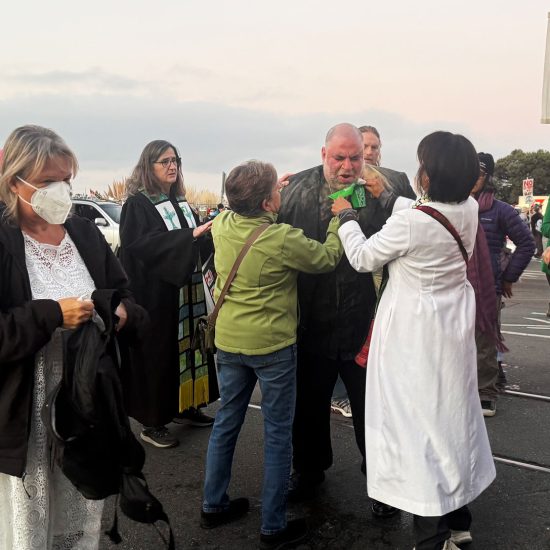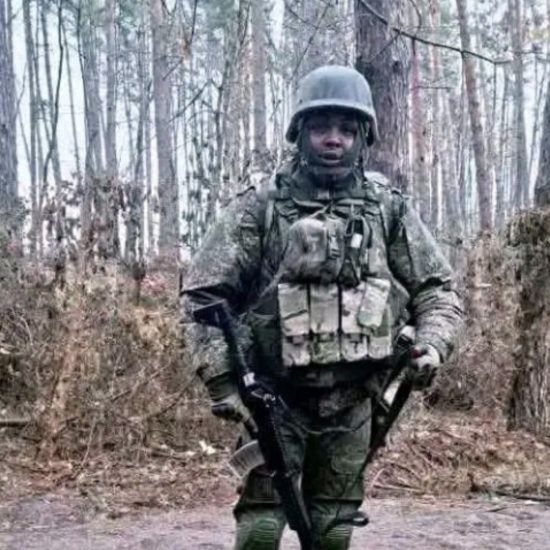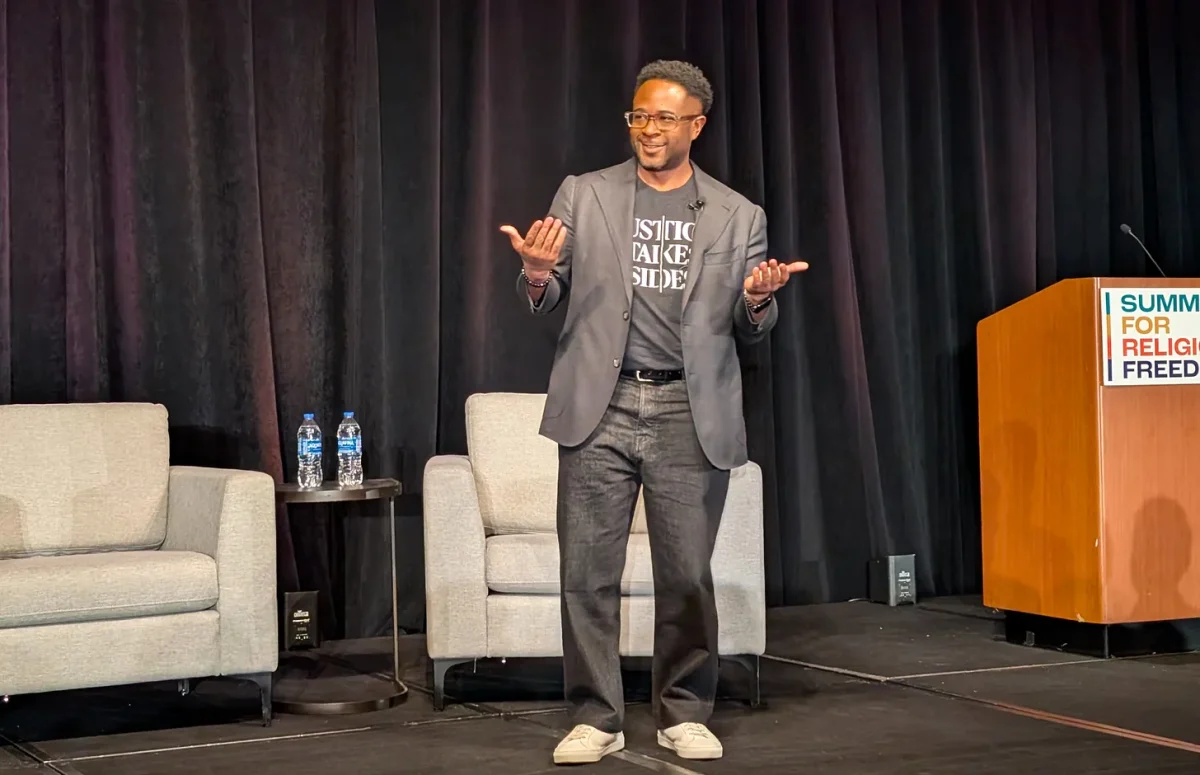
NOTE: This piece was originally published at our Substack newsletter A Public Witness.
“I believe in the separation of church and state. This isn’t a hard equation because the kind of religion that the state traditionally enforces has not been good for my people.”
Author and historian Jemar Tisby offered that assessment as he contrasted the difference between Christian Nationalism and the political witness of the Black Christian tradition. His remarks kicked off the third annual Summit for Religious Freedom in the Washington, D.C., area this week. The Summit was organized by Americans United for Separation of Church and State (where I serve as a board member), and I co-led a workshop on Christian Nationalism at the Summit with Katherine Stewart, author of Money, Lies, and God.
For Tisby, author of The Spirit of Justice: True Stories of Faith, Race, and Resistance, Christians concerned about the decline of Christianity in the U.S. “need to be concerned about White Christian Nationalism.”
“White Christian Nationalism is the greatest threat to democracy and the witness of the church in the United States today,” he argued. “Why are people leaving the church leaving Christianity? It’s not because we love too much. It’s not because we practiced too much justice, too much equality, too much love. It’s because they see White Christian Nationalism and they say, ‘Well, if that’s Christianity, I want nothing to do with it.’ And rightly so.”
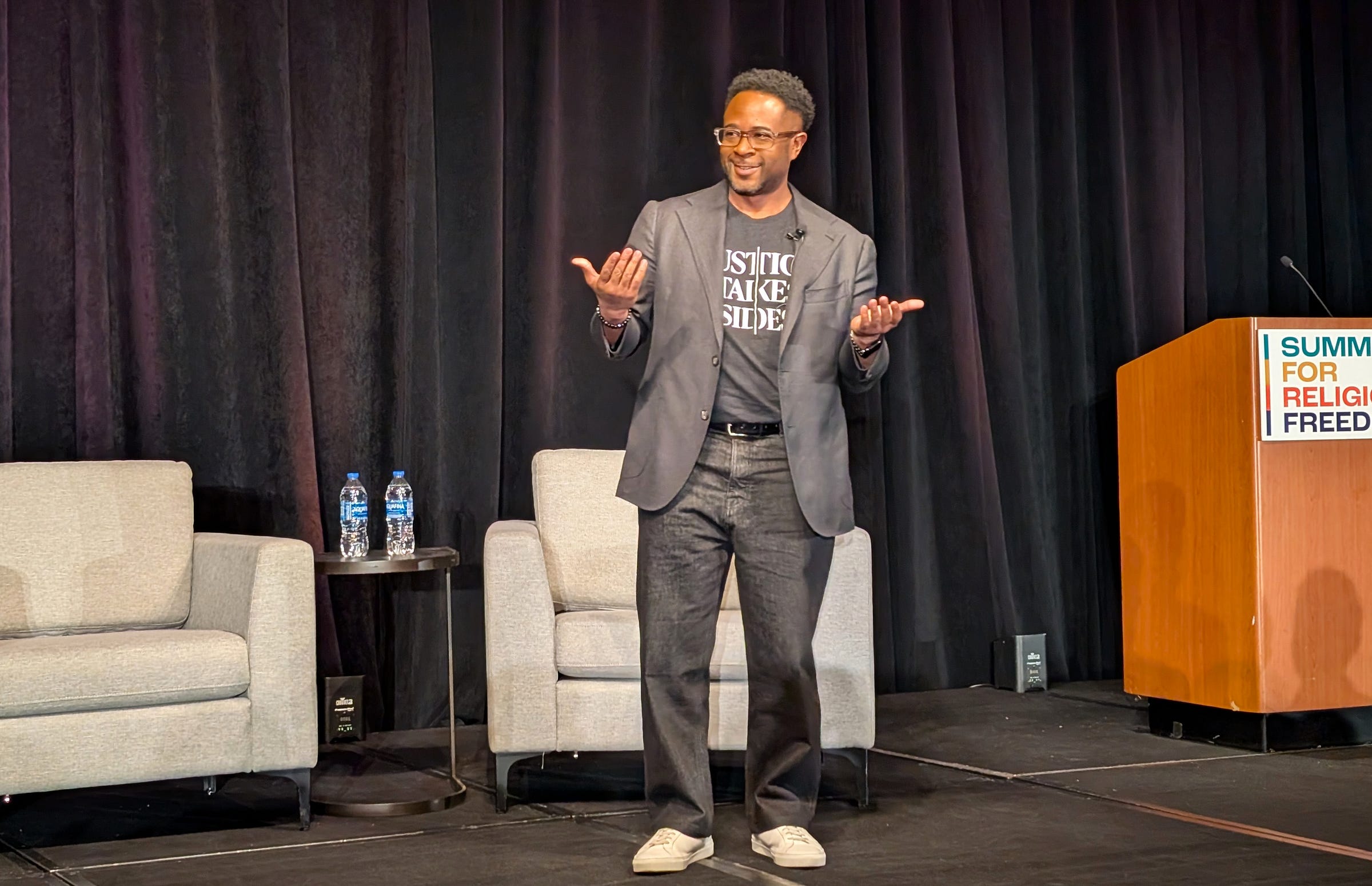
Jemar Tisby speaks during the Summit for Religious Freedom in Alexandria, Virginia, on April 6, 2025. (Brian Kaylor/Word&Way)
Insisting there’s a difference between “the Christianity of Christ and White Christian Nationalism,” Tisby argued we must distinguish between them while critiquing the latter. Thus, he urged those present at the Summit — a mix of Christians, those of other faiths, and those of no faith — to advocate for church-state separation as a shield against Christian Nationalism while also appreciating people of faith bringing their values into the public square.
“I believe in the separation of church and state, but I believe that is distinct from the separation of faith and politics,” he said. “I’m not advocating that we force faith on others. I’m advocating that we understand how faith informs our politics. … Your principles inform your politics.”
“You can be holy-rooted in your faith or belief system but not hijacked by an anti-democratic agenda. You can love the church and not want the state to force your beliefs on others, he added. “Whatever your definition of holy is, don’t let it be hijacked by fear, don’t let it be hijacked by lies, don’t let it be hijacked by the false prophets of power.”
As an example of this contrast, Tisby played a clip from Sen. Cory Booker’s record-setting longest speech in the Senate when Booker talked about how his faith taught him to love immigrants and care for the poor. Tisby noted that “Senator Booker’s understanding of religion shaped his politics.”
“I appreciate the whole Bible, but in his words, there was less Ten Commandments more Sermon on the Mount; less dominance and authority, more compassion and love; less judgment and punishment, more equality and justice,” Tisby said. “As we look at history, that’s what the Black Christian political witness has traditionally been about. It looks very different from the religion that’s often trotted out as Christianity, which I call White Christian Nationalism. This is not a speech you would have heard House Speaker Mike Johnson say, for instance.”
“There’s a contrast there. There’s a different story. There’s a different narrative to tell about the way religion and politics can interact,” Tisby added as he told stories about faithful Black activists like Charles H. Pierce, Frederick Douglass, and Fannie Lou Hamer.
This different story means looking at Christianity that’s not in power. As Tisby noted about the history of Black Christians in the nation amid slavery, discrimination, and attacks, “We didn’t practice the kind of Christianity that the people in power approved of.” Looking for a faith that’s “holy but not hijacked,” Tisby explained that means “we pursue our religion sincerely, but we avoid being hijacked by the promises of empire.”
Tisby’s focus on telling stories to show the importance of church-state separation and counter the deceptions of Christian Nationalism ran throughout the Summit. And as AU President and CEO Rachel Laser said after Tisby’s address, part of this means highlighting Christian voices for church-state separation: “Given that the country is a majority Christian country, if we don’t have Christians with us on church-state separation, we’re in big trouble. So we really appreciate having Christians with our cause, I say as the leader of AU and as a Jew.” So this issue of A Public Witness takes you inside the Summit for Religious Freedom to hear from leading advocates about what is needed in this moment and how Christians can help.
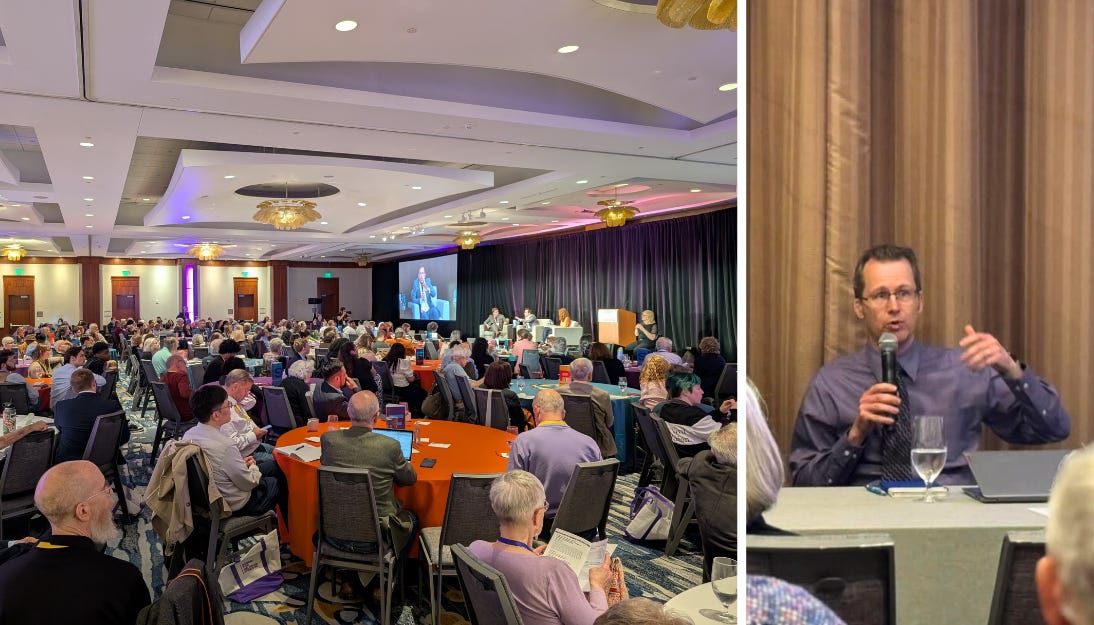
Left: People listen at the Summit for Religious Freedom in Alexandria, Virginia, as Rev. Douglas Avilesbernal, executive minister of the Evergreen Association of American Baptists, speaks during a panel. (Brian Kaylor/Word&Way). Right: Brian Kaylor speaks during the Summit. (Starlette Thomas/Good Faith Media)
Imperial Co-Option of Faith
Like Tisby, journalist and Lutheran minister Angela Denker highlighted the danger of Christianity being used to further the aims of imperial power. The author of the new book Disciples of White Jesus: The Radicalization of American Boyhood, Denker warned in her remarks at the Summit about the danger of Christian Nationalism as an imperial distortion of faith.
“When we merge religion with power, what gets destroyed is religion, what gets destroyed is faith,” she said. “I think it’s a sign of a weak and a desperate faith if your faith is so weak and desperate and your God is so weak and desperate as to be threatened by those of other faiths.”
“White Christian Nationalism in America is but our most recent chapter of an ancient story of what happens when Christianity is co-opted by empire,” she added. “This is an ancient, ancient story. It goes back to the Crusades. We now have a secretary of defense in this country — unfortunately from my home state of Minnesota — Pete Hegseth, who has Christian Crusader tattoos. And so it’s important for people to know, this is not a Republicans-Democrats partisan battle. This is an ancient battle of what happens when religion is co-opted by empire.”
Denker said that when talking about Christian Nationalism and imperial co-opting of the faith she likes to turn to John 18:33-38 where Jesus and Pilate spar over the meaning of the kingdom of God and Jesus explicitly rejected the idea that he came to take over and rule a political empire. In contrast to Jesus’s behavior and words, Denker lamented that today many are being discipled “by this dominant culture in America that paints God and paints Jesus as a muscular, violent, greedy, White man.”
In light of the history of Christian Nationalism and imperial co-option, Denker argued that as Christians engage in the public square, they should ask themselves, “Am I using my faith to exercise my power over others, to hold others down, or am I using my faith to look at how to increase liberation for other people.” Asking that question, she added, illuminates “what kind of faith in politics is helpful and strengthens democracy and strengthens the separation of church and state, and what kind of faith is leading us down a quick road to authoritarianism.”
One way for Christians to appreciate the need for church-state separation, Denker said, is to look back at their own tradition’s history to see times when they were not part of the majority. As a pastor in the Evangelical Lutheran Church in America, she mentioned that in the German Lutheran background for many congregations in her denomination, they originally worshiped in German even after immigrating to the U.S. but were “forced to switch and say we’re going to worship in English” amid the World Wars as anti-German sentiments erupted. Thus, those congregations could say, like the ancient Hebrew people were often reminded to remember, that they had been “brought out of Egypt.” She added that they should then consider “how do we use our privilege in order to fight for liberation.”
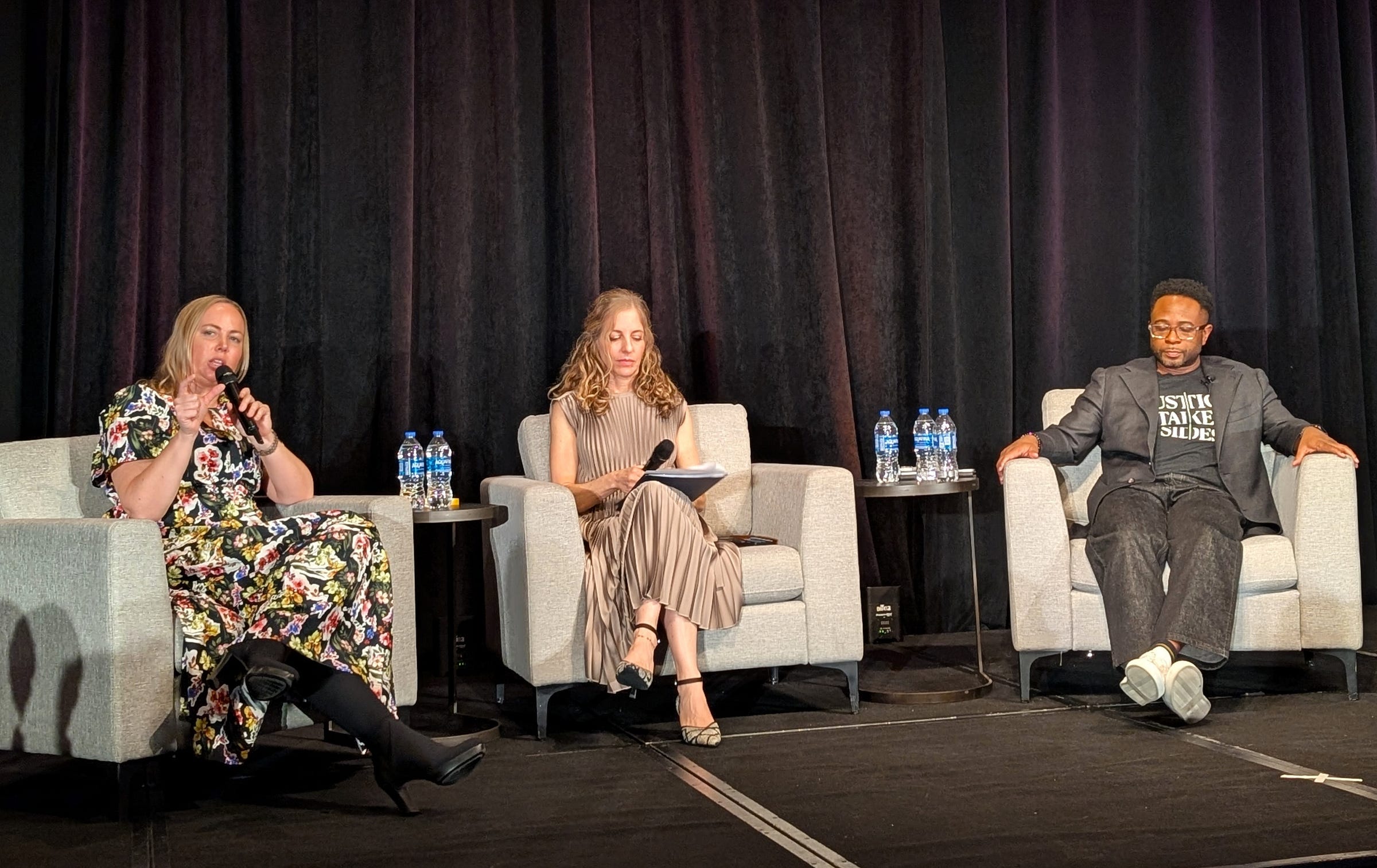
Angela Denker (left) speaks during a panel discussion with Rachel Laser and Jemar Tisby at the Summit for Religious Freedom in Alexandria, Virginia, on April 6, 2025. (Brian Kaylor/Word&Way)
Guthrie Graves-Fitzsimmons, senior director of policy and advocacy at Interfaith Alliance, similarly warned about allowing Christian Nationalism to misrepresent the core values and teachings of Christianity. Noting the history of religious voices — like Roger Williams and the Danbury Baptists — who advocated for church-state separation, Graves-Fitzsimmons argued that “church-state separation is grounded in a religious appeal for religious communities to be independent, and that message is one that still resonates today.” Attempting to instead force religious practices actually has consistently harmed religious institutions and practices.
“This idea from Christian Nationalists and far-right extremists that we are going to compel people and coerce them back into faith, that we will reverse years of religious decline in the United States … is counter-productive and counter to the history of why religious communities thrive throughout U.S. history,” he said. “As a Christian, as an ordained Baptist deacon, as someone who spent a lot of time in my life in church and studying theology at the graduate level … I don’t think it’s the role of the federal government to promote Christian moral values.”
As contemporary examples of problematic efforts to use the government power coercively, Graves-Fitzsimmons pointed to state legislation pushing “chaplains” in public schools and state bills mandating the posting of an edited version of the Ten Commandments in public school classrooms. He highlighted how Christians in various states are often leading the efforts to speak out against such legislation to argue that they don’t want “the government to take over their religious beliefs and force it on everybody.”
In contrast to Christian Nationalism, Graves-Fitzsimmons argued that religious freedom should be seen as “empowering religious communities to thrive, to evangelize, to spread, to grow, for new religions to be created, for a marketplace to exist where everyone is free to evangelize to each other.” Thus, he added, church-state separation is “good for the flourishing of our religious communities.”
Helping Christian Nationalists Change
While much of the Summit involved criticisms of Christian Nationalism and those who perpetuate it, several speakers also talked about the importance of trying to reach those who have been enmeshed in the ideology. Exvangelical social media influencer April Ajoy particularly highlighted this as she spoke about her own journey.
“Most people who are Christian Nationalists would say they’re not,” said Ajoy, author of Star-Spangled Jesus: Leaving Christian Nationalism and Finding a True Faith. “I was a Christian Nationalist, but I didn’t know it. And I do think that is key part to a lot of people who are Christian Nationalists today. They think they’re just being very Christian.”
“It’s really easy to paint all Christian Nationalists as these evil villains — and in a lot of ways they are, they’re harming a lot of people,” she added. “But they genuinely believe what they’re doing. I genuinely believed this was a war between good and evil, and that good was on the Republican side and that was the Christian side, and bad was everybody else.”
Ajoy talked about growing up as a pastor’s kid in a politically active family, going to conservative Christian schools, singing on Jim Bakker’s TV show, and working for Pat Robertson’s 700 Club Interactive program. In this world, she said the Christian Nationalism worked because her Christian identity was conflated with “a political ideology” and they became “so intertwined you don’t really know where one starts and other ends, they become one and the same.”
“I was taught a very whitewashed history, which a lot of American history is whitewashed already, but especially in White evangelicalism, Christian Nationalism,” Ajoy said.
“One of the bigger problems in stopping this is that you’re built with this belief system that any outside voice is suspicious,” she added. “It’s really hard to hold Christian Nationalists or just White, American evangelicals accountable because they take any sort of accountability as their badge of persecution. Because we were taught like the world will hate you like they hated Jesus. And if you’re not being hated, you’re not being a good Christian.”
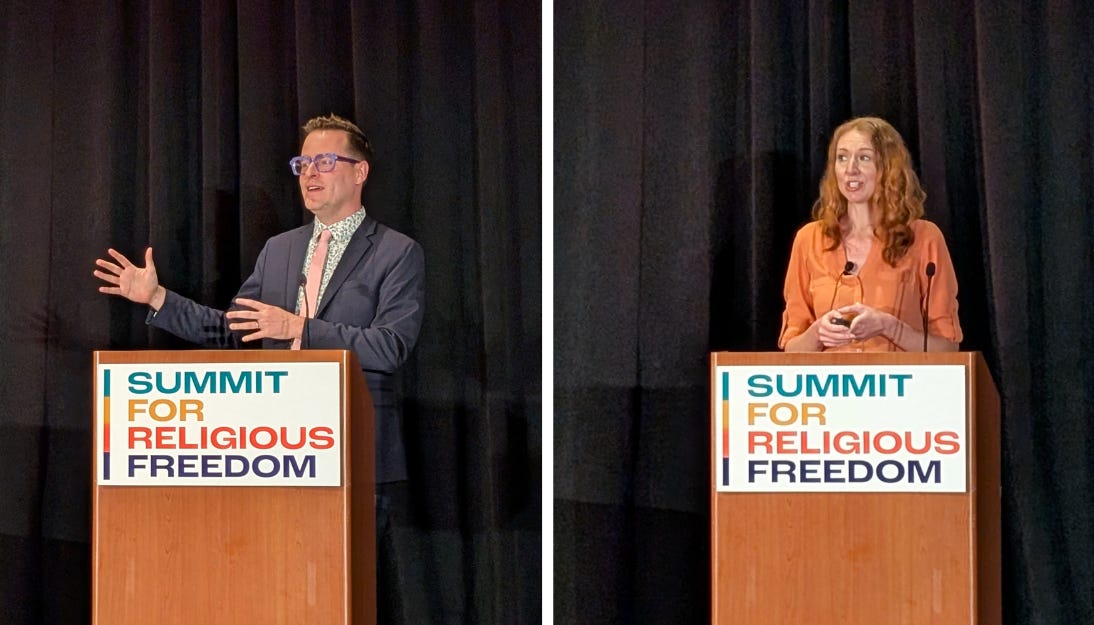
Guthrie Graves-Fitzsimmons (left) and April Ajoy (right) speak at the Summit for Religious Freedom in Alexandria, Virginia. (Brian Kaylor/Word&Way)
As she told the story of her own journey out of Christian Nationalism, Ajoy offered tips on how to engage with those in the ideology. She encouraged people to work on “separating Christian Nationalism from regular evangelicalism, holding beliefs versus forcing beliefs.” She added, “If we paint this broad brush that every evangelical is a Christian Nationalist, they’ll say, ‘You’re anti-Christ or anti-God or anti-Christian,’ and they’ll immediately stop talking to you. And I know that’s annoying because there are Christian Nationalists.”
Ajoy also mentioned that in addition to personal experiences — including her father’s death from cancer and her brother coming out as gay — a key part of her evolution was people asking questions that caused her to reconsider issues instead of trying to prove her wrong with facts.
“The thing that got me thinking the most was not people spitting facts, was not people telling me I was wrong and why I was wrong. It was people who asked me questions, who asked me questions that made me explain why I believed what I believed,” she recounted. “We don’t need to tell them what to think. They have people who have done that their whole lives. We need to ask questions to teach them how to think on their own.”
“I just want to leave you all with some hope,” she added. “I believe if I can change, anyone can.”
As a public witness,
Brian Kaylor
Check out our reports from previous Summits for Religious Freedom:
- 2024: Strengthening the Church-State Wall to Protect Democracy (featuring comments by Anthea Butler, Rep. Jamie Raskin, Lisa Sharon Harper, and others).
- 2023: Seeking a Recommitment to Church-State Separation (featuring comments by Katherine Stewart, Bradley Onishi, Traci Blackmon, and others).

